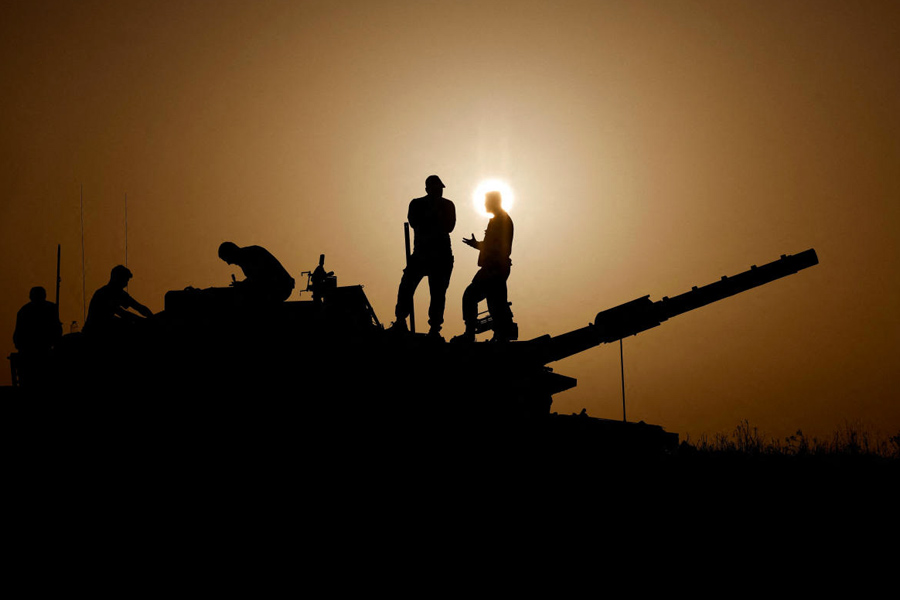The Israeli military said on Sunday that it had conducted overnight strikes in Lebanon, hours after a rocket fired from its northern neighbour killed at least 12 people, most of them children, in a town in the Israeli-controlled Golan Heights.
The initial Israeli response appeared to stop short of a major escalation, but there were still fears that the fallout from the rocket launch would lead to an all-out war. Prime Minister Benjamin Netanyahu of Israel, facing domestic pressure to mount a fiercer response, was set to meet with senior government ministers on Sunday afternoon to discuss further steps, after flying back early from a trip to the US.
Israel blamed Hezbollah, an Iranian-backed Lebanese group that has been attacking Israel in solidarity with Hamas, for Saturday’s deadly rocket attack on the Druse Arab town of Majdal Shams. Hezbollah has denied it was responsible.
US secretary of state Antony J. Blinken said at a news conference on Sunday in Tokyo that there was “every indication” that the rocket was fired by Hezbollah.
US diplomats worked on Sunday to contain the hostilities and asked Lebanon’s government to relay a message to Hezbollah to show restraint in the face of a further Israeli response, according to Lebanon’s foreign minister, Abdallah Bou Habib.
“We are trying to restrain Hezbollah now from retaliating to whatever the Israelis do next,” Bou Habib said in a call with The New York Times.
The Israeli military said its overnight strikes had chiefly targeted places in Lebanon that it had often hit in the past, mostly close to the border with Israel or surrounding the southern port of Tyre. It reported one strike in the Bekaa Valley, roughly 60 miles north of the Israel-Lebanon border, where it has been striking less frequently since February.
Lebanon’s state-run news agency reported extensive damage and some casualties resulting from the overnight Israeli strikes that began shortly after midnight and lasted until dawn. It was not immediately clear if the casualties were civilians or militants.
The rocket strike on Saturday, which hit children at a soccer field, was the deadliest assault on Israeli-controlled territory since Israel and Hezbollah began exchanging missile and rocket fire in October.
Some Israelis want Netanyahu to authorise a full-scale ground invasion of southern Lebanon in order to deter similar attacks. But others fear that such a move would prompt a far more devastating response from Hezbollah, whose arsenal of weapons is considered larger and most sophisticated than almost any other nonstate actor in the region.
Israeli commanders are also wary of opening up a second major war while the war in Gaza is still raging. After nine months of fighting with Hamas and Hezbollah, Israel’s munitions stockpiles have dwindled, raising questions about how intense a battle it could fight in Lebanon.
For now, Israeli officials say that they are still open to a diplomatic resolution to the conflict with Hezbollah. Israel’s foreign ministry spokesman, Oren Marmorstein, said in a statement on Sunday that a full-scale war could still be averted through the enforcement of a never-implemented United Nations resolution from 2006 that would create a demilitarised zone in southern Lebanon.
Still, there were strong expectations on Sunday morning that Israel might mount a bigger response. That, analysts fear, could tip the low-level hostilities between Israel and militias led by Hezbollah into more intense conflict.
Roughly 100,000 people in Lebanon and 60,000 in Israel have been displaced, with scores of schools and health centres shuttered in both countries. More than 460 people in Lebanon have been killed, most of them militants. More than 100 were civilians, including 12 children and 21 health workers, according to the United Nations and Lebanon’s health ministry. The fighting has killed 22 Israeli soldiers and 24 civilians, according to the Israeli government.
But unlike in Gaza, both sides have largely avoided attacks that cause overwhelming loss of life, which would in turn prompt their opponent to respond with overwhelming force.
New York Times News Service











